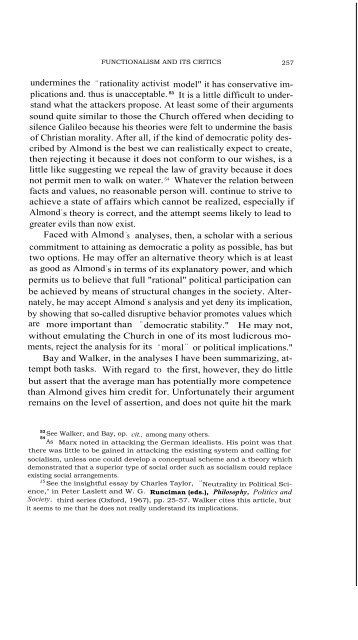FUNCTIONALISM AND ITS CRITICS - Intercollegiate Studies Institute
FUNCTIONALISM AND ITS CRITICS - Intercollegiate Studies Institute
FUNCTIONALISM AND ITS CRITICS - Intercollegiate Studies Institute
Create successful ePaper yourself
Turn your PDF publications into a flip-book with our unique Google optimized e-Paper software.
<strong>FUNCTIONALISM</strong> <strong>AND</strong> <strong>ITS</strong> <strong>CRITICS</strong> 257<br />
undermines the " rationality activist model" it has conservative implications<br />
and. thus is unacceptable. 53 It is a little difficult to understand<br />
what the attackers propose. At least some of their arguments<br />
sound quite similar to those the Church offered when deciding to<br />
silence Galileo because his theories were felt to undermine the basis<br />
of Christian morality. After all, if the kind of democratic polity described<br />
by Almond is the best we can realistically expect to create,<br />
then rejecting it because it does not conform to our wishes, is a<br />
little like suggesting we repeal the law of gravity because it does<br />
not permit men to walk on water. 54 Whatever the relation between<br />
facts and values, no reasonable person will. continue to strive to<br />
achieve a state of affairs which cannot be realized, especially if<br />
Almond ' s theory is correct, and the attempt seems likely to lead to<br />
greater evils than now exist.<br />
Faced with Almond ' s analyses, then, a scholar with a serious<br />
commitment to attaining as democratic a polity as possible, has but<br />
two options. He may offer an alternative theory which is at least<br />
as good as Almond ' s in terms of its explanatory power, and which<br />
permits us to believe that full "rational" political participation can<br />
be achieved by means of structural changes in the society. Alternately,<br />
he may accept Almond ' s analysis and yet deny its implication,<br />
by showing that so-called disruptive behavior promotes values which<br />
are more important than " democratic stability." He may not,<br />
without emulating the Church in one of its most ludicrous moments,<br />
reject the analysis for its " moral " or political implications."<br />
Bay and Walker, in the analyses I have been summarizing, attempt<br />
both tasks. With regard to the first, however, they do little<br />
but assert that the average man has potentially more competence<br />
than Almond gives him credit for. Unfortunately their argument<br />
remains on the level of assertion, and does not quite hit the mark<br />
53 See Walker, and Bay, op. cit., among many others.<br />
54<br />
As Marx noted in attacking the German idealists. His point was that<br />
there was little to be gained in attacking the existing system and calling for<br />
socialism, unless one could develop a conceptual scheme and a theory which<br />
demonstrated that a superior type of social order such as socialism could replace<br />
existing social arrangements.<br />
J5 See the insightful essay by Charles Taylor, " Neutrality in Political Science,"<br />
in Peter Laslett and W. G. Runciman (eds.), Philosophy, Politics and<br />
Society, third series (Oxford, 1967), pp. 25-57. Walker cites this article, but<br />
it seems to me that he does not really understand its implications.
















